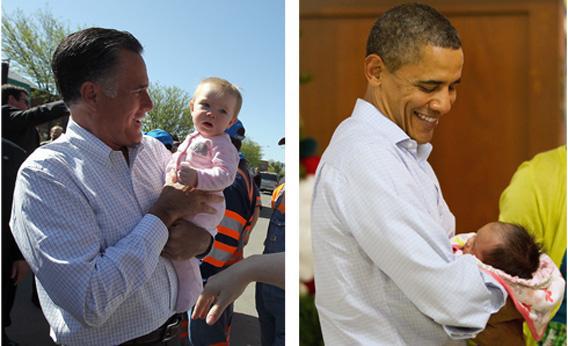The Slate/SurveyMonkey political survey returns with this month’s snapshot of the opinions of more than 1,000 registered voters across the country. (Information on respondents is available here. More information about SurveyMonkey Audience is here.) Our last installment revealed that, while Obama trounced Romney in likeability, his personal charm didn’t necessarily translate into high marks for governing. This time, we wanted to get a sense of whether feelings about the POTUS had changed—do we still trust him to baby-sit our kids—and also to examine the reception of one of Romney’s big talking points: that his business experience will make him a successful president.
We started off by asking, again, “If your car was broken down on the side of the road, which presidential candidate would you want to stop and help you change the tire?”
Obama is still considered more likeable than Romney. In fact, the likeability gulf between Obama and Romney widened even a little more this month: More than 47 percent of respondents (up from 45 percent) would rather see the current president approaching in his Ford, while only 21 percent (down from 23.9 percent) would prefer a Romney motorcade. And the same trend was true when we again asked which candidate people would choose to hire as a baby-sitter. More than 48 percent of those surveyed opted for Obama, compared to May’s 46 percent, and 21.1 percent picked Romney, a dip of 0.7 percent from last month.
Of course, Miss Congeniality doesn’t always win the beauty pageant: A top-notch personality can only take you so far. We wondered if respondents thought Romney would have done any better with the reins of power than Obama did in 2009.
Opinion was divided: More than 23 percent believed the governor would have performed “about the same,” compared to the 22.8 percent that felt he would have handled the position “much worse.” Just over 21 percent speculated that Romney might have acquitted himself “somewhat better” than Obama as president—but, on the other hand, 17.3 percent imagined he would have done “somewhat worse.” And 15.5 percent, the smallest group, envisioned Romney steering the ship of state “much better” than the incumbent in 2009. In other words, no consensus was reached.
Still, Obama’s charisma is clearly a campaign asset, especially if POTUS succeeds in framing 2012’s contest as a face-off between him and Romney, rather than a referendum on the economy. We wondered whether the former governor’s business expertise—a selling point he hammers away at on the campaign trail—offers him any advantage.
“In your opinion, would electing leaders with business experience be helpful in fixing our country’s current economic problems or not?” we asked.
A sizeable 30.7 percent of survey takers thought that business acumen would prove “somewhat helpful” to a U.S. president trying to revive the economy. And 38.4 percent said they considered such a background “very” or “extremely” beneficial. Only 15.3 percent of respondents were skeptical that business smarts spelled presidential aptitude, at least in the abstract.
When the question specifically mentioned Romney, though, the numbers became slightly less favorable. (Still, the erstwhile Bain boss should take heart: His record is likely to give him at least a small boost).
We asked, “Will Mitt Romney’s business experience make him a better president, a worse president, or neither a better nor a worse president?”
Fewer than 20 percent of respondents found Romney a poorer choice for his time in the private sector. And while the largest plurality, 36.4 percent, held that his past at Bain would not affect his governing ability, a combined 43.8 percent of those surveyed viewed Romney’s corporate record as a positive.
The upshot? The former governor can make electoral inroads by mining his business history, just as Obama can count on his personal magnetism to rake in ballots. But who would the survey takers vote for if the election were held today?
When we posed that query, the POTUS gathered 45.1 percent of respondents’ votes, compared to 35.5 percent for Romney. Obama drifted upward from 44.7 percent last month, while his opponent slipped slightly, from 38.3 percent.
But preference for one candidate doesn’t necessarily spell high hopes. Curious about how many people believed that the election results would affect their day-to-day existence, we asked: “In general, do you think your life will get better, get worse, or stay the same if Barack Obama is re-elected?” And then we flipped the question to probe attitudes about a Romney White House: What did survey takers think would happen to them if Mitt took the helm?
The results suggested voters aren’t overly optimistic, no matter who wins. When it came to the possibility of four more years of Obama, the most sizable group, 28.7 percent, expected nothing much to change. A cautious 25.6 percent supposed life would get “somewhat better” (only 7.8 percent anticipated things turning “a great deal better”), and a combined 37.9 percent thought life would get worse. Meanwhile, 26.1 percent of survey takers contended that a Romney presidency would shift things in a “somewhat better” direction, trailed closely by the 24 percent that suspected life would proceed as usual. Just over 42 percent overall gloomed that they would suffer either “somewhat” or “a great deal” with Romney in office. Only 7.9 percent thought their lives would improve significantly with the former governor.
So even as they cast hypothetical ballots for Obama or Romney, survey takers seem to be withholding their vote of confidence in the American political system.
